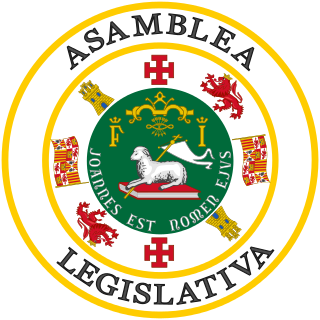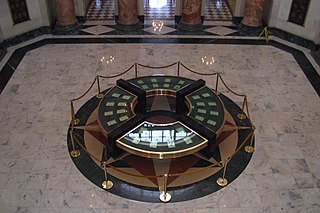
The government of Puerto Rico is a republican form of government with separation of powers, subject to the jurisdiction and sovereignty of the United States. Article I of the Constitution of Puerto Rico defines the government and its political power and authority pursuant to U.S. Pub.L. 82–447. Said law mandated the establishment of a local constitution due to Puerto Rico's political status as a commonwealth of the United States. Ultimately, the powers of the government of Puerto Rico are all delegated by Congress and lack full protection under the U.S. Constitution. Because of this, the head of state of Puerto Rico is the President of the United States.

The federal government of the United States is the national government of the United States, a federal republic in North America, composed of 50 states, a federal district, five major self-governing territories and several island possessions. The federal government is composed of three distinct branches: legislative, executive and judicial, whose powers are vested by the U.S. Constitution in the Congress, the president and the federal courts, respectively. The powers and duties of these branches are further defined by acts of Congress, including the creation of executive departments and courts inferior to the Supreme Court.
In government, unicameralism is the practice of having one legislative or parliamentary chamber. Thus, a unicameral parliament or unicameral legislature is a legislature which consists of one chamber or house.
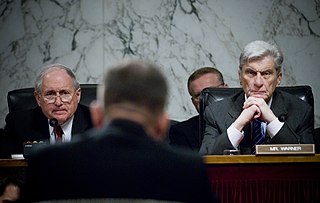
A congressional committee is a legislative sub-organization in the United States Congress that handles a specific duty. Committee membership enables members to develop specialized knowledge of the matters under their jurisdiction. As "little legislatures", the committees monitor on-going governmental operations, identify issues suitable for legislative review, gather and evaluate information, and recommend courses of action to their parent body. Woodrow Wilson once wrote, "it is not far from the truth to say that Congress in session is Congress on public exhibition, whilst Congress in its committee rooms is Congress at work." It is neither expected nor possible that a member of Congress be an expert on all matters and subject areas that come before Congress. Congressional committees provide valuable informational services to Congress by investigating and reporting about specialized subjects.
A congressional subcommittee in the United States Congress is a subdivision of a United States congressional committee that considers specified matters and reports back to the full committee.
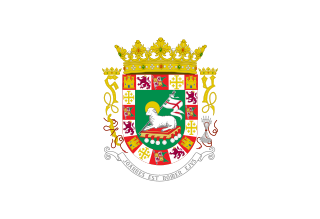
The governor of Puerto Rico is the head of government of Puerto Rico and, by its nature, constitutes the executive branch of the government of the island. The governor is also the commander-in-chief of the island's military forces, the Puerto Rico National Guard.

The Senate of Puerto Rico is the upper house of the Legislative Assembly of Puerto Rico, the territorial legislature of Puerto Rico. The Senate, together with the House of Representatives of Puerto Rico, control the legislative branch of the government of Puerto Rico.

Elections in Puerto Rico are guaranteed by Article VI of the Constitution of Puerto Rico and the Electoral Code of Puerto Rico for the 21st Century Act. All processes are overseen and managed in whole by the Puerto Rico State Elections Commission; an autonomous agency of the executive branch of the government of Puerto Rico.

The Jones–Shafroth Act —also known as the Jones Act of Puerto Rico, Jones Law of Puerto Rico, or as the Puerto Rican Federal Relations Act of 1917— was an Act of the United States Congress, signed by President Woodrow Wilson on March 2, 1917. The act superseded the Foraker Act and granted U.S. citizenship to anyone born in Puerto Rico on or after April 25, 1898. It also created the Senate of Puerto Rico, established a bill of rights, and authorized the election of a Resident Commissioner to a four-year term. The act also exempted Puerto Rican bonds from federal, state, and local taxes regardless of where the bond holder resides.

Juan Manuel Dalmau Ramírez is a Puerto Rican lawyer and politician. He is an advocate of the Puerto Rican independence ideal, and a member of the Puerto Rican Independence Party (PIP) of which he is Secretary General. He appeared in the general elections held on November 8, 2016 as a candidate of the Puerto Rican Independence Party for the position of Senator At-large, and as such was elected.

A referendum on how many chambers the Legislative Assembly should have was held in Puerto Rico on July 10, 2005. The proposed change to a unicameral legislature was supported by 83.94% of those voting, although voter turnout was just 22.58%. However, another referendum would have to be held to approve the specific amendments to the constitution that are required for the change. The House of Representatives subsequently let the bill die, so the changes were not realised. Had the changes been approved, the legislature would have become unicameral from 2009 onwards.
Voting rights of United States citizens in Puerto Rico, like the voting rights of residents of other United States territories, differ from those of United States citizens in each of the fifty states and the District of Columbia. Residents of Puerto Rico and other U.S. territories do not have voting representation in the United States Congress, and are not entitled to electoral votes for President. The United States Constitution grants congressional voting representation to U.S. states, which Puerto Rico and other U.S. territories are not, specifying that members of Congress shall be elected by direct popular vote and that the President and the Vice President shall be elected by electors chosen by the States.
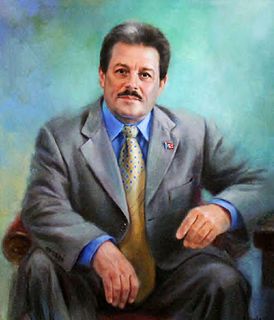
Antonio "Tony" J. Fas Alzamora is a Puerto Rican politician and Senator. He is currently the longest-serving legislator in the history of Puerto Rico, having served in ten Legislative Assemblies, one House of Representatives, and nine Senates.
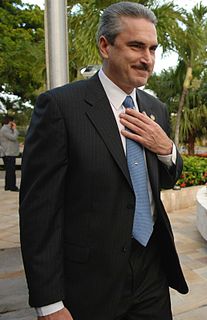
The President of the Senate of Puerto Rico is the highest-ranking officer and the presiding officer of the Senate of Puerto Rico. The president has voting powers as it is elected amongst the own members of the Senate as established by Article III of the Constitution of Puerto Rico. The Constitution, however, does not establish its functions and since the Senate is the only body authorized by the Constitution to regulate its own internal affairs, the functions of the president vary from session to session—save being called "President" as the Constitution establishes. The president is typically elected during the Senate's inaugural session.

The executive branch of the government of Puerto Rico is responsible for executing the laws of Puerto Rico, as well as causing them to be executed. Article IV of the Constitution of Puerto Rico vests the executive power on the Governor—whom by its nature forms the executive branch.
The Cabinet of Puerto Rico is the cabinet of the government of Puerto Rico and is composed of the most senior appointed officers of the executive branch of the government of Puerto Rico, who are generally the heads of the executive departments —known as the Council of Secretaries— and other officers at the same bureaucratic level—known as the Cabinet-level officers.

The legislative branch of the government of Puerto Rico is responsible for enacting, amending, and repealing the laws of Puerto Rico. Article III of the Constitution of Puerto Rico vests the legislative power on the Legislative Assembly—which together with other agencies form the legislative branch. Article IV vests the executive power on the Governor —whom by its nature forms the executive branch— while Article V vests the judicial power on the Supreme Court of Puerto Rico—which by its nature forms the judicial branch. Although the Constitution does not establish such law, the legislative branch is also composed of other agencies which are subject to the Legislative Assembly but are not part of it.
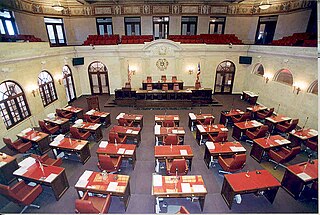
The 26th Senate of Puerto Rico is the upper house of the 18th Legislative Assembly of Puerto Rico. Its counterpart in the lower house is the 30th House of Representatives of Puerto Rico.
